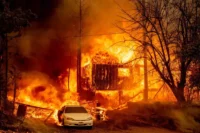
How Well Does Masking Work? And Other Pandemic Questions We Need to Answer.
When the coronavirus took off in 2020, the unknowns were immense, as was the urgency. It was clear that the virus was novel, that it was spreading widely and that it was killing many of the people it infected. And there was no vaccine or proven drug treatment. This was the context in which states first mandated masks, issued stay-at-home orders and closed schools, among other measures — an emergency.
But now we should have more data from this pandemic to guide our decisions. We don’t send rockets into space without collecting data to monitor their progress and detect if they are veering off course.… Seguir leyendo »
















